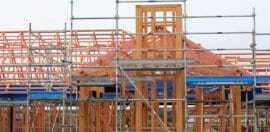Federal government wipes hands clean of setting strategy to end homelessness, but states pick up the pieces

22 February 2022 at 8:14 am
A number of state government initiatives have been announced to support an end to homelessness
Housing advocates have labelled the federal government’s refusal to develop a national homelessness strategy as “deeply disappointing”, vowing to try to end homelessness without federal leadership.
Calls to develop and implement a 10-year national strategy to end homelessness – something that advocates have long fought for – were at the centre of the recommendations made by the parliamentary inquiry into homelessness.
However in a response made on Friday, the Morrison government rejected the call, saying it would fully support just two of the 35 recommendations made by the bipartisan committee.
It put responsibility back on to the states saying the bi-lateral agreements between the Commonwealth and individual states required states to have publicly available housing and homelessness strategies.
“This allows for flexible and targeted responses to better address homelessness when compared to one size fits all centralised,” the report said.
Homelessness Australia chair Jenny Smith said that this refusal wasn’t just disappointing for vulnerable people needing assistance, but also for homelessness services around the country.
Smith said it was disappointing that another of the key recommendations to provide more money towards accommodation for women and children facing family violence was also rejected by the government.
“The government made no extra commitments, only outlining previous spending,” Smith said.
“Throughout its response, the federal government repeatedly attempts to push the responsibility of housing and homelessness onto the states and territories, but it is clear this national crisis requires a national response.”
“We’re going to do the best we can”
the CEO of the Australian Alliance to End Homelessness, David Pearson said that while the Commonwealth’s refusal to support a national strategy was a “devastating blow” to the homelessness and housing sector, local and state governments weren’t about to sit back and wait for action to happen.
“We just have to show leadership at a local level and not wait for the government to solve this… so we’re going to give it a go,” Pearson told Pro Bono News.
“Ending homelessness requires us to end everyone’s homelessness in the community and that requires all levels of government to support that.”
State and local governments step up
At the end of last week, the South Australian government announced its commitment to ending homelessness by 2025.
It said it would achieve this by becoming a “vanguard state”, which refers to a global movement designed to help cities end street homelessness by collecting data on who is actually experiencing homelessness and what their needs are. This data is then used by community organisations to provide services such as housing, mental health support and drug and alcohol rehabilitation.
The government will work closely with the South Australian Alliance to End Homelessness (SAAEH) to bring together a range of people and organisations already committed to end homelessness in the state.
While it’s not the first time an Australian state has become a vanguard state (in 2019 New South Wales committed to ending street sleeping by 2030), this commitment by SA was “pivotal”.
Pearson said that it would hopefully encourage other states to follow suit and for national efforts to be adopted.
Separate from the South Australian announcement, on Friday the Victorian government announced a new inclusionary zoning levy that is expected to raise around $800 million a year, and fund the delivery of up to 1,700 new social and affordable homes annually.
With 46.7 per cent of Victorians who receive Commonwealth Rent Assistance paying more than 30 per cent of their income in rent in 2021, advocates welcomed the new initiative.







